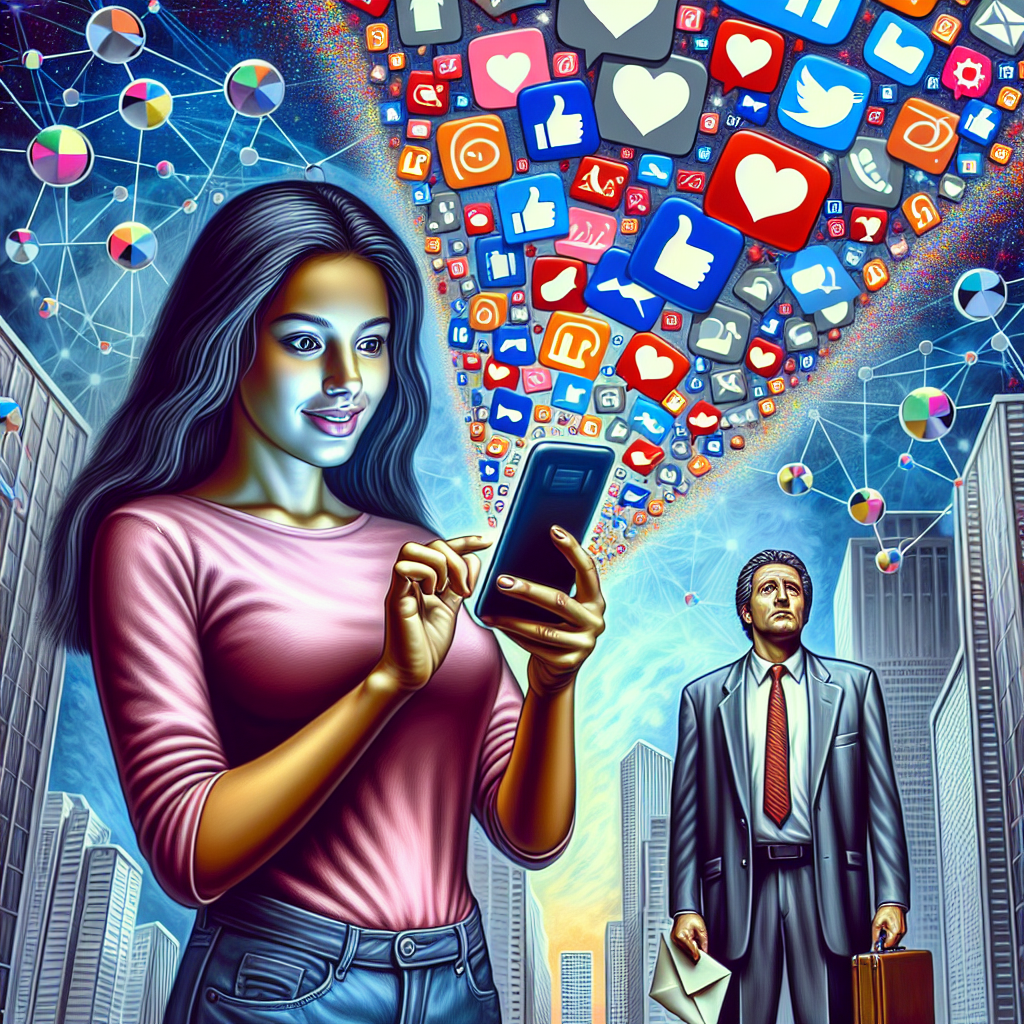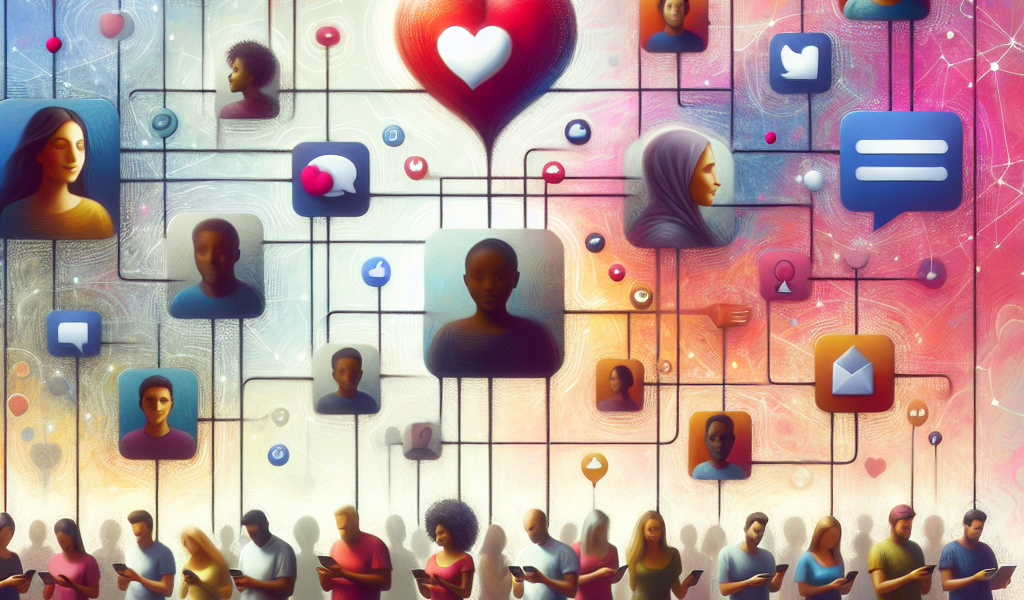-
Table of Contents
“Connecting Worlds, Shaping Realities: The Social Media Revolution”
Introduction

The advent of social media has revolutionized the way individuals interact, communicate, and perceive the world around them. Platforms such as Facebook, Twitter, Instagram, and LinkedIn have not only transformed personal relationships but have also significantly influenced societal norms and communication practices. This essay explores the multifaceted impact of social media on society and communication, examining both the positive and negative consequences. By analyzing changes in social dynamics, information dissemination, and interpersonal communication, we can better understand the profound effects that social media has had on our daily lives and the broader social fabric.
The Evolution of Social Media and Its Influence on Modern Communication
The advent of social media has revolutionized the way individuals communicate, interact, and perceive the world around them. Initially emerging as platforms for personal expression and connection, social media networks have evolved into powerful tools that shape societal norms, influence public opinion, and redefine communication paradigms. This transformation has been both rapid and profound, altering the landscape of human interaction in ways that were previously unimaginable.
In the early 2000s, platforms like MySpace and Friendster laid the groundwork for what would become a global phenomenon. These early networks allowed users to create personal profiles, share updates, and connect with friends. However, it was the launch of Facebook in 2004 that truly marked the beginning of a new era in social media. Facebook’s user-friendly interface and expansive reach quickly garnered a massive user base, setting the stage for the proliferation of other platforms such as Twitter, Instagram, and Snapchat. Each of these platforms brought unique features and functionalities, further diversifying the ways in which people could communicate and share information.
As social media platforms grew in popularity, their influence on communication became increasingly evident. Traditional forms of communication, such as face-to-face conversations and telephone calls, began to take a backseat to digital interactions. The immediacy and convenience of social media allowed for real-time communication across vast distances, breaking down geographical barriers and fostering a sense of global interconnectedness. This shift was particularly pronounced among younger generations, who quickly adapted to the new modes of interaction and began to favor them over more conventional methods.
Moreover, social media has democratized the flow of information, enabling individuals to share their thoughts, opinions, and experiences with a global audience. This has given rise to citizen journalism, where ordinary people can report on events and issues that may not receive coverage from traditional media outlets. The ability to disseminate information quickly and widely has also empowered social movements, allowing activists to mobilize support and raise awareness on a scale that was previously unattainable. The Arab Spring, for instance, demonstrated the power of social media in organizing protests and galvanizing public sentiment.
However, the influence of social media on communication is not without its drawbacks. The rapid spread of information has also facilitated the dissemination of misinformation and fake news, posing significant challenges to the credibility and reliability of online content. The echo chamber effect, where users are exposed primarily to information that aligns with their existing beliefs, can further entrench divisions and polarize public opinion. Additionally, the curated nature of social media profiles often leads to the presentation of idealized versions of reality, contributing to issues such as social comparison and mental health concerns.
Despite these challenges, the impact of social media on modern communication is undeniable. It has transformed the way people connect, share, and engage with one another, creating new opportunities for interaction and collaboration. As social media continues to evolve, it will be crucial for users, policymakers, and platform developers to navigate its complexities and harness its potential for positive societal impact. The ongoing dialogue surrounding the ethical use of social media, data privacy, and the regulation of online content will play a pivotal role in shaping the future of communication in the digital age.
Social Media’s Role in Shaping Public Opinion and Trends
Social media has undeniably become a cornerstone of modern communication, profoundly influencing public opinion and trends. As platforms like Facebook, Twitter, and Instagram have grown in popularity, they have transformed the way individuals interact, share information, and form opinions. This digital revolution has not only altered personal communication but has also had significant implications for society at large.
One of the most notable impacts of social media is its ability to shape public opinion. Through the rapid dissemination of information, social media platforms have become powerful tools for influencing the masses. News, whether accurate or not, spreads quickly, often reaching millions of users within minutes. This immediacy can be both beneficial and detrimental. On one hand, it allows for the swift sharing of important information, such as emergency alerts or breaking news. On the other hand, it can also lead to the spread of misinformation and fake news, which can have serious consequences for public perception and behavior.
Moreover, social media has democratized the flow of information, giving a voice to individuals who might otherwise be marginalized. This has led to the rise of citizen journalism, where ordinary people report on events and issues that mainstream media might overlook. Consequently, social media has become a platform for social activism and political engagement. Movements such as #BlackLivesMatter and #MeToo have gained momentum through social media, highlighting issues of racial injustice and gender inequality, respectively. These movements have not only raised awareness but have also prompted real-world actions and policy changes.
In addition to shaping public opinion, social media plays a crucial role in setting trends. Influencers, celebrities, and even ordinary users can drive trends in fashion, technology, and lifestyle. The viral nature of social media content means that a single post can spark a global trend within hours. This phenomenon is particularly evident in the fashion industry, where brands and designers often collaborate with influencers to promote their products. The result is a dynamic and ever-changing landscape where trends can emerge and fade at a rapid pace.
However, the influence of social media on trends is not limited to consumer behavior. It also extends to cultural and societal norms. For instance, social media has played a significant role in normalizing discussions around mental health. Hashtags like #MentalHealthAwareness and #SelfCare have encouraged open conversations about mental well-being, reducing stigma and promoting a culture of support and understanding.
Despite its many benefits, the pervasive influence of social media also raises concerns. The pressure to conform to online trends and the constant comparison to others can have negative effects on mental health, particularly among young people. Studies have shown that excessive use of social media can lead to feelings of inadequacy, anxiety, and depression. Furthermore, the echo chamber effect, where users are exposed primarily to information that aligns with their existing beliefs, can exacerbate polarization and hinder constructive dialogue.
In conclusion, social media wields significant power in shaping public opinion and trends. Its ability to rapidly disseminate information and give a voice to the voiceless has transformed the landscape of communication and societal engagement. While it offers numerous benefits, it also presents challenges that must be addressed to ensure a balanced and healthy digital environment. As social media continues to evolve, its impact on society will undoubtedly remain a topic of critical importance.
The Psychological Effects of Social Media on Human Interaction
The advent of social media has revolutionized the way individuals communicate and interact, bringing about profound psychological effects on human interaction. As platforms like Facebook, Twitter, and Instagram have become integral parts of daily life, they have reshaped social dynamics, influencing both the nature and quality of interpersonal relationships. While social media offers unprecedented opportunities for connection, it also presents significant psychological challenges that merit close examination.
One of the most notable psychological effects of social media is its impact on self-esteem and self-worth. The constant exposure to curated images and posts often leads individuals to compare their lives with the seemingly perfect lives of others. This phenomenon, known as social comparison, can result in feelings of inadequacy and low self-esteem. Studies have shown that individuals who frequently engage in social comparison on social media are more likely to experience symptoms of depression and anxiety. The pressure to present an idealized version of oneself can also lead to a distorted self-image, further exacerbating mental health issues.
Moreover, social media has altered the way people perceive and engage in social interactions. The immediacy and convenience of online communication have led to a decline in face-to-face interactions, which are essential for developing deep and meaningful relationships. The lack of non-verbal cues, such as body language and facial expressions, in online communication can result in misunderstandings and a sense of detachment. This shift towards digital interaction has raised concerns about the erosion of empathy and the ability to form genuine connections.
In addition to affecting individual self-perception and social interactions, social media has also influenced collective behavior and societal norms. The phenomenon of “echo chambers,” where individuals are exposed only to information and opinions that reinforce their existing beliefs, has contributed to increased polarization and division within society. This can lead to a lack of understanding and tolerance for differing viewpoints, further entrenching social divides. The spread of misinformation and the rise of “fake news” on social media platforms have also had significant implications for public discourse and trust in information sources.
Despite these challenges, it is important to recognize the positive aspects of social media on human interaction. Social media has provided a platform for marginalized voices to be heard and has facilitated social movements and activism on a global scale. It has enabled people to maintain connections with friends and family across geographical distances and has fostered a sense of community and belonging for individuals with shared interests and experiences. The ability to access a diverse range of perspectives and information can also promote greater awareness and understanding of global issues.
In conclusion, the psychological effects of social media on human interaction are multifaceted and complex. While social media has the potential to enhance connectivity and foster positive social change, it also poses significant challenges to mental health and the quality of interpersonal relationships. As society continues to navigate the digital age, it is crucial to develop strategies to mitigate the negative impacts of social media while harnessing its potential for positive influence. This requires a concerted effort from individuals, communities, and policymakers to promote digital literacy, encourage healthy online behaviors, and create supportive environments that prioritize mental well-being.
The Impact of Social Media on Privacy and Data Security
In the digital age, social media has become an integral part of daily life, revolutionizing the way people communicate and share information. However, this transformation has brought with it significant concerns regarding privacy and data security. As individuals increasingly rely on platforms like Facebook, Twitter, and Instagram to connect with others, they often unwittingly expose themselves to various risks associated with the sharing of personal information.
One of the primary concerns is the sheer volume of data that social media platforms collect from their users. These platforms gather extensive information, ranging from basic details like names and birthdates to more sensitive data such as location, browsing habits, and even private messages. This data collection is often justified by the need to enhance user experience and provide targeted advertising. However, the potential for misuse of this information cannot be overlooked. For instance, data breaches have become alarmingly common, with hackers gaining access to vast amounts of personal information, leading to identity theft and financial loss for countless individuals.
Moreover, the issue of consent is a significant factor in the discussion of privacy on social media. Users often agree to terms and conditions without fully understanding the extent of data collection and how their information will be used. This lack of transparency can lead to a false sense of security, leaving users vulnerable to exploitation. Additionally, the practice of data mining, where companies analyze user data to predict behavior and preferences, raises ethical questions about the extent to which personal information should be commodified.
Furthermore, social media platforms themselves have been criticized for their handling of user data. High-profile scandals, such as the Cambridge Analytica incident, have highlighted the potential for abuse when data is not adequately protected. In this case, the personal information of millions of Facebook users was harvested without their consent and used for political purposes, sparking widespread outrage and calls for stricter regulations. This incident underscored the need for greater accountability and transparency from social media companies regarding their data practices.
In addition to these concerns, the rise of social media has also led to increased surveillance by both corporations and governments. Companies track user activity to build detailed profiles for advertising purposes, while governments may monitor social media to identify potential threats or dissent. This surveillance can have a chilling effect on free expression, as individuals may self-censor out of fear that their online activities are being watched.
To address these issues, there have been calls for stronger data protection laws and regulations. The European Union’s General Data Protection Regulation (GDPR) is one such example, aiming to give individuals more control over their personal data and impose stricter penalties on companies that fail to protect it. However, the effectiveness of these regulations depends on their enforcement and the willingness of social media companies to comply.
In conclusion, while social media has undoubtedly transformed communication and society, it has also introduced significant challenges related to privacy and data security. The vast amounts of personal information collected by these platforms, coupled with the potential for misuse and lack of transparency, pose serious risks to individuals. As society continues to navigate the complexities of the digital age, it is crucial to strike a balance between the benefits of social media and the protection of personal privacy. This will require concerted efforts from governments, corporations, and individuals alike to ensure that the digital landscape remains a safe and secure space for all.
Conclusion
The impact of social media on society and communication is profound and multifaceted. It has revolutionized the way individuals interact, share information, and form communities, breaking down geographical barriers and fostering global connectivity. Social media platforms have democratized content creation and dissemination, giving voice to diverse perspectives and enabling real-time communication. However, this transformation also brings challenges, including the spread of misinformation, privacy concerns, and the potential for social isolation. The influence of social media on societal norms, political discourse, and personal relationships underscores its significance in contemporary life, necessitating a balanced approach to harness its benefits while mitigating its drawbacks.




